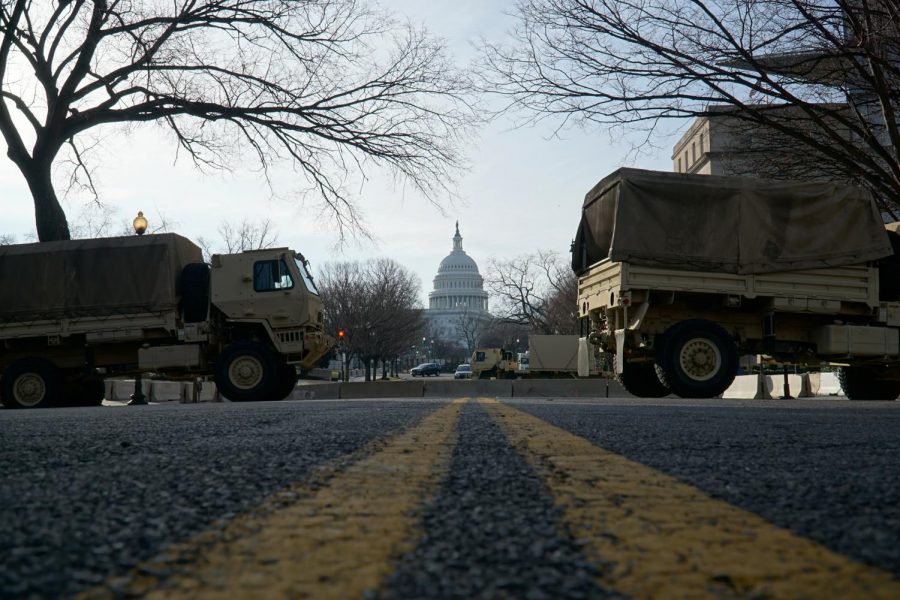Political tension leads to security increase in Washington, D.C.
February 23, 2021
With a growingly divisive and potentially violent political climate in the Nation’s capital, Washington, D.C., has seen a significant increase in security measures.
The first of these measures being the deployment of 25,000 National Guard troops after the insurrection at the Capitol, which also led up to President Joe Biden’s inauguration. After a pro-Trump rally ended in the storming of the U.S. Capitol on Jan. 6, the FBI warned of similar actions from Trump supporters at Biden’s inauguration. At the inauguration, the National Guard’s purpose was to prevent a deadly riot like the one at the Capitol from occurring. The 25,000 troops are approximately three times as many that are usually deployed for a presidential inauguration.
“You aren’t going to run errands when all you see are tanks, and men and women with guns, blocking intersections and roads,” Madison science teacher and D.C. resident Scott Hazen said.
However, the security of the guard troops was called into question when 12 National Guard members were found to have right-wing militia group ties. These members were consequently removed; two had posted and texted extremist views while the other ten were found to have potential for criminal activity.
“The extreme abundance of force is very nerve wracking, especially when you hear that some of them are being arrested for connection to radical groups or for possession of copious amounts of ammunition,” Hazen said.
None of the members posed a direct, imminent threat to President Biden.
In addition to the heavy National Guard presence, razor-wire fences and security checkpoints were scattered along the perimeter of the U.S. Capitol. Security checkpoints were also set up around incoming roads to search vehicles, and major bridges in and out of D.C. were closed.
“You can’t get around the city easily if you live in the Downtown area of [Northwest],” Hazen said. “Also, if you commute in and out of the city, the closing of the bridges made getting to and from work very challenging! You had to drive north into Maryland, get on the Beltway (I-495) and drive around. Not ideal.”
These extensive security measures ultimately paid off; the National Guard reported that there were no confrontations with protestors at the Inauguration. There were also few organized protests at other state capitols.
Though it has been two weeks since the Inauguration, there are currently 7,000 troops still stationed in D.C. The D.C. National Guard will remain in the capital through the fall of 2021; officials estimate that the total cost of the National Guard’s deployment will cost $450 million. The extension of security measures is meant to prevent possible violence during former President Trump’s impeachment trials, which resumed the week of Feb. 8.
As the National Guard remains on duty, and sleeping at the Capitol and in parking garages, the COVID-19 virus is spreading quickly through the troops. The implementation of social distancing and mask protocols has been spotty, especially when guard members stayed two to a room in the beginning of their deployment. On Jan. 23, the positive test rate for the troops reached 15%. In one West Virginia unit of 180 members, 107 tested positive for COVID-19.
Though the sights of armed soldiers and tanks, and the thought of COVID-19 ravaging through troops, could be worrisome for D.C. residents, this setting is met with a form of remembrance and hope. The Biden-Harris team constructed a COVID-19 memorial at the Lincoln Memorial Reflecting pool, which was part of a lighting ceremony on Jan. 19 to commemorate those who have died during the pandemic.
“I think after the raid on the capital [the deployment of the National Guard] was necessary,” Hazen said. “I will say that the memorial for the 400,000 dead to COVID-19 was beautiful and seen by all in the city. So there were some benefits to living there and getting to see that.”



